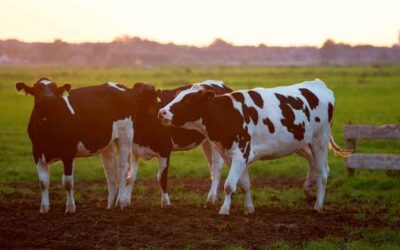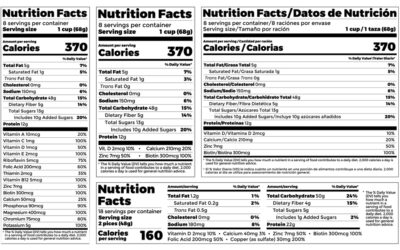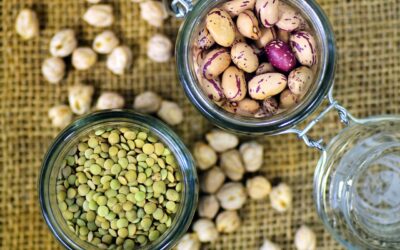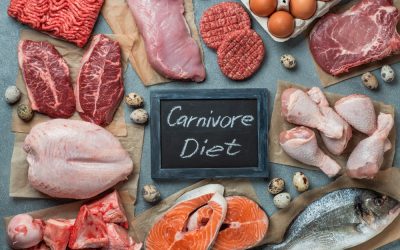Proteins are the basis of the body which is found in body cells, tissues, bones, blood and hormones etc. Protein is very essential for the composition and development of the body. It contain carbon, hydrogen, oxygen and nitrogen elements. So today we will tell you about Protein Requirements by Age.
Some proteins are also found with sulphur, phosphorus, iodine, iron and copper etc. The unit of protein is amino acids. The body contains a variety of proteins that are formed from amino acids. Amino acids are 24 in number.
Eight amino acids are not produced in the body, which are essential amino acids and are obtained from food. Some amino acids are produced in the body and are called unessential amino acids. So, before know about protein requirements by age, let’s see more about protein.
What is Protein?
The word protein is taken from the Greek word Proteus. It means first or foremost. Protein is very essential for the body and every living cell in the body needs protein. Protein is a micro-nutrient and the body needs a high amount of protein in the diet for its day-to-day work. In a balanced diet, 15-35 per cent of the total calories should be of protein.
Protein are mainly made of amino acids and give energy to cells. Each gram protein contains 4 calories. It consists two types of amino acids, the first amino acid that the body can make from any food, but in other types of amino acids, the body has to eat particularly protein-rich things. 9 out of 20 amino acids are considered to be very essential for the body and must be included in the diet.
However, every person needs protein, but adolescents and children need a large amount of protein. This can develop their bodies properly. In addition, proteins also work to create and improve new cells. Proteins are very essential for keeping the skin, hair, bones, nails, body cells, muscles and organs healthy.
| Footnote. The main ingredient of human food is protein. 24 amino acids produce a variety of proteins. Vegetation and animals are sources of protein. All enzymes are proteins and wickers are bio-catalysts. |
What are the Building Blocks of Proteins?
The basic building blocks of proteins are amino acid. They are small organic molecules consist of an alpha (central) carbon atom linked to an amino group, carboxyl group, a hydrogen atom and a variable component called side chain. There are 20 amino acids in protein what we eat and are present in the body. They are all linked together to form a large protein molecules.
Are Enzymes Proteins?
Yes, enzymes are protein mainly globular proteins- whose molecular structure is generally rounded, ball shaped. These proteins act as an active catalyst.
Foods High In Protein.
We can overcome protein deficiency through our diet. Good and natural sources of protein are pulses, flour, raw vegetables, milk, yogurt, soybean, groundnut, nuts, egg, chicken and fish etc.
Vital Proteins.
There are many types of proteins, which are differently classified. A classification is also done on the basis of shape. According to this, there are two types of proteins:
Threading Protein (Fibrous Protein).
When the shape of the protein is as long and thin as a thread. It is insoluble in water. This type of protein does not contain polypeptide chain spring (coil). For this, keratin is present in hair, nails, skin. Myosin it is present in the muscles, collagen cartage and bones.
Globular Protein.
This type of protein is in spherical shape. In this type of protein, polypeptide chain (coil) is in spherical form. Molecules in the coil are attached to the hydrogen bond. This protein is soluble in water. Such as-
- Enzyme– Pepsin- helps in digestion in the stomach.
- The hormone– insulin – originates from the pancreas and regulates the amount of glucose in the blood.
- Hemoglobin– Transports oxygen present in the blood from the lungs to the tissues.
- Antibodies – Gamma Globulin – Present in the blood, enhances immunity and protects against external infections.
The second classification is done on the basis of structure. There are two types of protein based on this,
Ordinary Protein.
The protein that gives only amino acid on water decomposition is called ordinary protein. Such as albumin, globulin and serum albumin.
Mixed Proteins.
Proteins that give amino acids and non-peptide on water decomposition are called mixed proteins. Non-peptide part is called prostatic group. Such as-
Glyco Protein.
Mucin in Sputum- Prostatic Group- Carbohydrates.
Since prostatic group phosphoric acid in phospho protein milk.
| Read Now: Breakfast Cereals: Healthy or not? |
Different Protein Types.
The different types of protein are:
- Structural protein.
- Antibodies.
- Contractile protein.
- Hormonal protein.
- Enzymes.
- Transport protein.
- Storage protein.
Transmembrane Protein Types.
There are two types of transmembrane protein, they are:
- Alpha-helicals.
- Beta barrels.
Benefits of Protein.
Protein for Weight Loss.
The use of proteins is very important for keeping our body healthy. It helps us to make muscle mass. It is very beneficial in weight loss. Proteins in our body takes more time to digest it, which makes the appetite feel too late, as a result we eat less, it helps us to lose weight. The use of proteins helps to keep bones, ligaments and other connective tissues healthy.(1)
Protein Boost Immunity Power.
It increases immune system and helps in removing dirt from the body and it is a good nutrient for skin and hair. A protein called keratin is in our hair and nails which makes the hair strong, shiny and flexible.(2)
Protein for Proper Growth in Children.
Protein is very useful for the growth of children. It helps to heal wounds or injury immediately. The use of proteins also makes the brain faster. High protein diet is a natural remedy for blood sugar, high BP and cardiovascular diseases. (3), (4)
Protein Produce Tissues & Cells.
Proteins produce tissues and cells in the body. It plays an important role in the growth and development of the body. Proteins are essential for the formation and repair of tissues and cells. Protein regulates the metabolic action in the body. (5)
Protein Balance Hormones.
This control is carried out by enzymes and hormones. Protein transports oxygen and essential elements from one place to another through blood. Proteins present in the blood cause fluid movement between blood tissues. (6)
Protein for Cells Repair.
New cells and tissues are needed to develop the cells and form a new cells, which is supplied by proteins. The breakdown of cells and tissues even when it is operated, which requires protein to fill. (7)
Protein for Milk Production.
In pregnancy, women need more protein because new tissues and capillaries are produced. Therefore, pregnant women have been recommended to consume 75 grams of protein. Protein is essential for milk production. Children, adolescents need more protein. In the absence of any disease, after the operation, proteins are required when a fracture occurs. Even in old age, tissues need protein.
Protein for Kidney Disease.
When there is kidney disease, the protein with urine goes out of the body, so that the protein requirement increases in the body. The body should supply protein with mixed proteins, which do not reduce the essential amino acids. Vegetarians must consume 200-300 ml of milk per day. (8)
| Read Now: Nutrition Concerns for Adolescence |
How to Detect Protein Deficiency in the Body?
Protein deficiency is detected by measuring the level of albumin, transferring protein in the blood and the measurement of total nitrogen content in the body.
Effects of Excess Protein Intake.
Protein is very essential for the human body. But sometimes the intake of more protein than the proper amount can harmful for the body. Excess protein intake leads to kidney stones, heart and liver problems.
It is generally not beneficial to consume more protein than is required. More protein are not stored in the body and it removed from the body. In this action, the kidneys have to do more effort. This increases the likelihood of kidney failure.
When more proteins are present in the body, it accumulates in the form of fat. Which increases obesity which is very painful. Excess protein intake leads to hypertension, joint diseases and arthritis. Which cause discomfort along with growing age. So you always naturally meet the amount of protein.
| Read Now: Keto Diet and its Unexpected Effectiveness. |
Symptoms and Disadvantages of Protein Deficiency.
It is important to take protein as per your requirements according to your age. Because protein deficiency in the body occurs for a variety of reasons, usually when proteins are not present in adequate quantities in food. There is a shortage of protein even when the calorie intake in food is low.
Infections.
Diarrhea, dysentery and infection in the intestines leads to protein deficiency. Proteins are not produced due to liver diseases. Removal of proteins from the body occurs due to kidney diseases. In both the situations, there is a shortage of proteins. Protein deficiency is particularly visible in children.
Reduce Immunity Power.
If protein requirements according to your age is not sufficient may causes serious health problems. There are obvious symptoms of protein deficiency that are visible in children. Protein deficiency reduces disease resistance capacity. Due to this, infectious diseases are easily caused. Protein deficiency in children slows down their growth and stops their length.
Reduce Weight.
Not only that, the activity of children is also reduced and it is always sluggish. Protein deficiency in children leads to drought disease and also reduces weight. Excess protein deficiency leads to kwashiorkor disease. This causes spots on the skin and the infection and it also becomes easier and quicker.
Other Problems.
Lack of protein causes a number of problems in our body such as frequent hunger, thinner hair, delicate nails, confusion, irritability and depression, prolonged delay in wound healing, prolonged recovery from diseases, brain exhaustion, honeybee, decreased physical development, malnutrition in children, joint and muscle pain, weakening of the brain, frequent illness, sleeplessness and weight gain etc.
What are the Effects of Protein Deficiency in Pregnant Lady?
Protein deficiency in pregnancy leads to the birth of an immature, underweight and premature baby. Which does not lead to enough milk for the baby after the delivery. The woman and the infant have low blood and her health worsens due to weakness.
What are the Effects of Protein Deficiency in Adults?
When there is a protein deficiency in adults, the muscles become thinner, hair loss occurs, fatigue, nails, skin becomes gloss less and the ability to work is also reduced. The breath of some people also starts to thrive. When there is a protein deficiency, the pace of intelligence development is slow.
How Much Protein Do I Really Need?
Following are the recommended daily protein requirements by age;
- Infants aged 6 months of birth should be taken close to 10 grams.
- Child of 9 to 13 years should take close to 19-34 grams.
- A man of 14 to 18 years should take close to 50 grams.
- Woman of 14 to 18 years should take close to 46 grams.
- A man of 19 to 50 years should take close to 52 grams.
- Woman of 19 to 50 years should take close to 46 grams.
- The pregnant woman should be taken close to 71 grams.
- The lactating woman should be taken close to 71 grams.
If you need 2000 calories per day, 10 to 14% of these calories should be met by protein. Because every gram of protein has 4 calories, it means that you should consume 50 to 71 grams of protein-rich food per day. This will give you 200 to 284 calories out of 2000 calories.
It is necessary to present the required amount of protein in your food. This protein is called ideal or whole protein if all the necessary amino acids are present in a protein. It is derived from animals such as meat, fish, rooster, egg, milk, etc. If the protein does not contain the necessary amino acids, this protein is called non-essential protein.
Proteins from flora like cereals, pulses, fruits and vegetables etc., fall under this category. Proteins from vegetable sources are cheaper and readily available than proteins derived from animals. In cereals, lysine and threonine amino acid are low, while pulses are deficient in methionine.
Vegetarian human beings get the protein requirement from food and milk etc. The amount of protein varies in different substances, the details of which are as follows:
| Food Stuffs | Protein per 100 gm |
| Soybean | 43.3 |
| Paneer | 40.3 |
| Sprouted wheat | 29.2 |
| Peanuts | 25.2 |
| Urad dal | 24 |
| Rajma | 22.9 |
| Tur Dal | 22.9 |
| Cashew nuts | 21.2 |
| Almonds | 20.8 |
| Chana dal | 17.1 |
| Maize | 11.9 |
| Wheat | 11.8 |
| Rice | 6.8 |
| Milk (Cow) Milk (Buffalo) | 4.1 6.5 |
| Chicken | 25.9 |
| Goat’s flesh | 20 |
| Fish | 19.5 |
| Egg | 13.3 |
Protein Requirements By Age.
The protein requirement varies in different stages and conditions. It depends on gender, disease and body weight.
The most needed protein is for breastfeeding infants, children and adolescents and women. An average intake of protein recommended intake is 60 grams for men and 55 grams of protein per day for women. But according to the Institute of Medicine, one should get at least 10% of your daily calories from protein. The daily consumption of protein should not exceed 35%.
The level of albumin in the blood is 3.5 g per 100 mm less than that, there will be protein deficiency. The required amount of protein depends on age, gender and working conditions. The protein requirement will vary under different conditions.
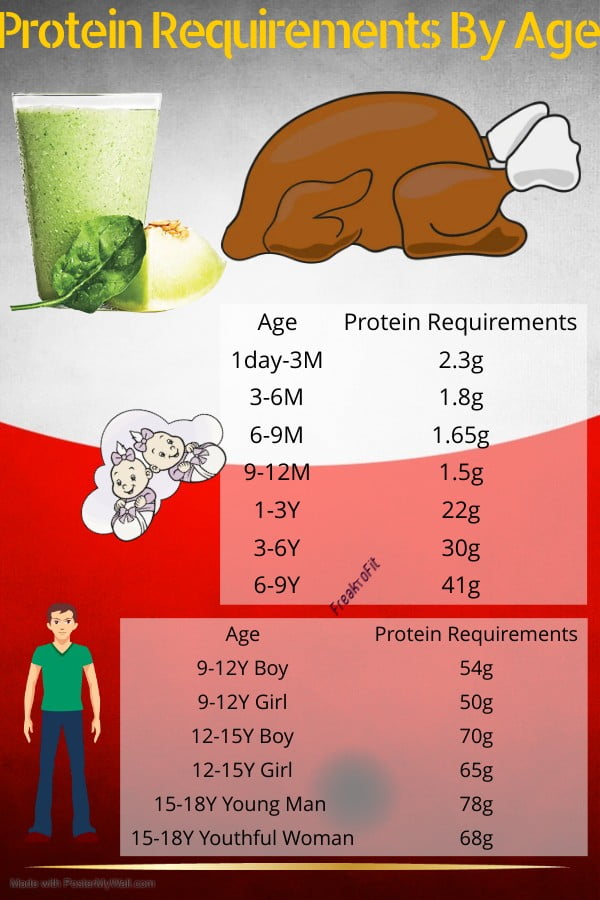
Protein Requirements By Age Calculator.
Click here to check your protein requirements by age.
Frequently Asked Questions.
1. What is whey protein?
Whey protein is a high quality protein that is completely vegetarian because it is made of milk. It consist 20% of milk protein, the most important thing is a complete protein containing essential amino acids. Whey protein is one of the best sources of branched amino acids (BCAAs) which contains all amino Acids, branched Amino Acids, Glutamine, Luecine, etc., it is considered to be the best for muscle manufacturing. In addition, whey protein is also very easy to digest.
2. Where are protein synthesized in the cell?
Protein synthesized are takes place in the cellular structures called ribosomes which found out-side of the nucleus. Cells have several ribosomes and the exact number depends upon how a particular cell is active in synthesizing proteins. During the process, a constituent of ribonucleic acid (RNA) is synthesized.
3. How much protein in 1 egg white?
About 16 grams of protein is found in yellow egg yolk per 100 grams. The white part contains 11 grams of protein. According to the Howard School of Public Health, if you are incorporating an egg into your diet every day, you are meeting about five per cent of the protein content in the body.
4. How much protein in Cottage Cheese?
100 grams of cottage cheese contains 98 kcal of energy, 3.38 grams of carbohydrates, 4.6 grams of fat, 2.6 grams of sugar, 11.12 grams of protein. In addition, other vitamins such as thiamine, riboflavin and niacin, etc., are also found in cottage cheese.
5. How much protein in 1 banana?
- Calories-105.
- Total Fat– 0.4 gm.
- Saturated Fat- 0.1 gm.
- Polyunsaturated Fat- 0.1 gm.
- Sodium– 1 mg.
- Potassium- 422.44 gm.
- Carbohydrates– 27 gm.
- Dietary Fiber- 3.1 gm.
- Sugars- 14.4 gm.
- Protein– 1.3 gm.
- Vitamin A- 2%.
- Vitamin C- 17%.
- Calcium- 1%.
- Iron- 2%.
6. What is the monomer of proteins?
The monomer of proteins is amino acids.
Bottom Line.
Protein are required to increase immunity power and for other several health benefits. Excessive protein causes hypertension, obesity, arthritis and kidney disease etc. Protein deficiency in the body weakens dwarfism, hair loss, weight loss and muscle loss etc. Proteins are simple, mixed, threaded and spherical.
Regular intake of proteins in proper quantities beneficial for the entire body. At the same time, immunity increases and health remains good. Good health leads to physical and mental development as well as growth and attraction. So, it is important to consume protein as per your requirements according to your age age.
A healthy body enhances gaiety, enthusiasm and enthusiasm in life. But if there is a protein deficiency, it makes the body weak. Life becomes monotonous and curse.
+8 Sources
Freaktofit has strict sourcing guidelines and relies on peer-reviewed studies, educational research institutes, and medical organizations. We avoid using tertiary references. You can learn more about how we ensure our content is accurate and up-to-date by reading our editorial policy.
- The role of protein in weight loss and maintenance; https://pubmed.ncbi.nlm.nih.gov/25926512/
- Protein proves influential to healthy immune system; https://www.sciencedaily.com/releases/2017/03/170313102420.htm
- Effects of protein or amino-acid supplementation on the physical growth of young children in low-income countries; https://www.ncbi.nlm.nih.gov/pmc/articles/PMC5914345/
- Protein intake from 0 to 18 years of age and its relation to health: a systematic literature review for the 5th Nordic Nutrition Recommendations; https://www.ncbi.nlm.nih.gov/pmc/articles/PMC3664059/
- Dietary Protein and Muscle Mass: Translating Science to Application and Health Benefit; https://www.ncbi.nlm.nih.gov/pmc/articles/PMC6566799/
- This Is What You Should Be Eating for a Happy Hormonal Balance; https://observer.com/2017/11/best-foods-for-balancing-your-hormones-through-diet/
- Protein’s Essential Role In Repairing Damaged Cells Revealed; https://www.sciencedaily.com/releases/2009/01/090106102907.htm
- Dietary Protein Intake and Chronic Kidney Disease; https://www.ncbi.nlm.nih.gov/pmc/articles/PMC5962279/

 Workout
Workout
 Meditation
Meditation


 Stories
Stories


 Podcast
Podcast E-book
E-book

